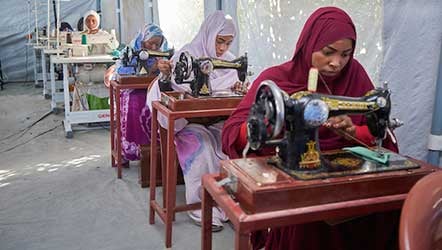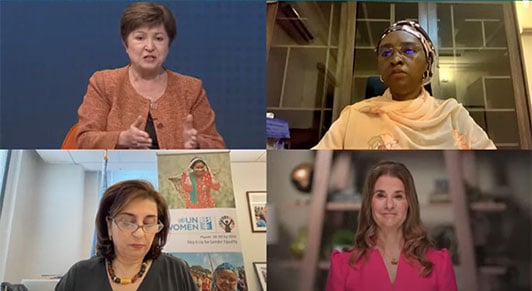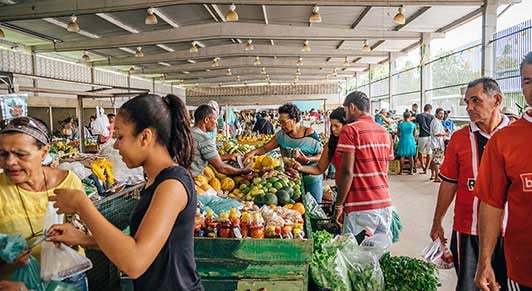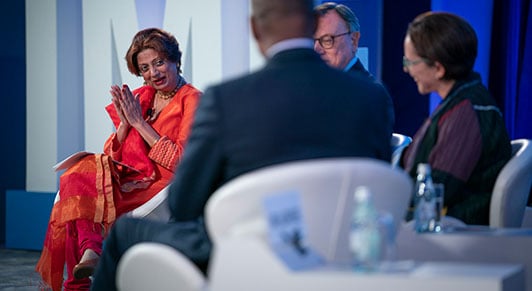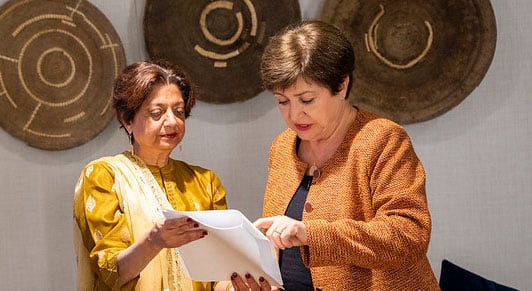Gender

Despite significant progress in recent decades, labor markets across the world remain divided along gender lines. Female labor force participation has remained lower than male participation, gender wage gaps are high, and women are overrepresented in the informal sector and among the poor. In many countries, legal restrictions persist which constrain women from developing their full economic potential. While equality between men and women is in itself an important development goal, women's economic participation is also a part of the growth and stability equation. In rapidly aging economies, higher female labor force participation can boost growth by mitigating the impact of a shrinking workforce. Better opportunities for women can also contribute to broader economic development in developing economies, for instance through higher levels of school enrollment for girls.
Global Economy Shakes Off Tariff Shock Amid Tech-Driven Boom
But risks are rising, including from the concentration of tech investment and the negative effects of trade disruptions, which may build over time
New Skills and AI Are Reshaping the Future of Work
Policy choices will determine whether workers and firms are adequately prepared for the AI revolution
Top 10 Blogs of 2025
Debt, Stablecoins, AI, and Global Economy’s New Era Drew Blog Readers
Top Five IMF Blog Charts of 2025
Chart of the Week visuals illustrate major developments during a year of uncertainty and resilience
How Stablecoins Can Improve Payments and Global Finance
New technology can foster innovation and financial inclusion, or cause fragmentation and turbulence in many countries
Better Economic Measurement Is About Wiser Use, Not Just More Data
Statistics are a means, not an end, that should serve the public by helping us see the world more clearly and make better decisions
Banking on Nonbanks
We study how banking groups adjust corporate credit supply in response to tighter macroprudential policies. Using granular data on syndicated corporate loans, we show that banking groups reallocate lending from bank subsidiaries toward affiliated nonbank financial institutions (NBFIs) following regulatory tightening. Relative to bank subsidiaries within the same group, NBFI subsidiaries expand lending, and their credit supply also increases in absolute terms. We estimate that by ‘banking on’ their nonbanks, banking groups offset, on average, more than half of the contraction in bank lending induced by macroprudential tightening. Our findings highlight an important intra-group reallocation channel through which banking groups can partially offset regulatory constraints and result in greater bank–nonbank interconnectedness.
Distributional Impacts of Inflation Accounting for Behavioral Effects and Real Assets
This paper analyzes the redistributive effects of inflation across 18 European economies from 2021:Q3 to 2022:Q2, using unique micro-datasets for this country sample. We estimate inflation’s impact on household welfare through the consumption basket, income, and wealth channels. Our main contribution is incorporating real assets into the wealth channel and accounting for behavioral responses to inflation in both the income and wealth channels. These factors significantly alter inflation’s distributional effects compared to previous literature. The inflation shock is estimated to have caused an average welfare loss equivalent to 18.5 percent of annual household income across our sample, with households in the poorest income quintiles suffering the largest losses. Cross-country differences also widen when real assets are incorporated, with a few economies even showing welfare gains for some or all quintiles because house prices rose faster than inflation.
Tonga: Technical Assistance Report-Liquidity Management and Forecasting
The IMF conducted a Technical Assistance (TA) mission to assist the National Reserve Bank of Tonga (NRBT) in determining an appropriate policy rate and in implementing an effective liquidity management and forecasting framework. This TA mission serves as a follow-up to previous IMF TA, which provided recommendations to the NRBT for modernizing its monetary policy implementation framework. The mission found that the NRBT has made commendable progress in modernizing its monetary policy implementation framework, including the establishment of an appropriately designed interest rate corridor with standing facilities and open market operations. However, the NRBT’s policy rate of 2 percent lacked analytical justification. In addition, liquidity forecasting was insufficiently robust, limiting effective liquidity management and the potential for interest rate steering. There were also gaps in the institutional arrangements for liquidity management, particularly relating to the lack of systematic daily monitoring of government account flows, which impaired forecast accuracy. To address these deficiencies, the mission recommended creating a dedicated Liquidity Forecasting Unit (LFU) to centralize data collection, forecast daily liquidity, and support policy decisions. The NRBT should utilize advanced statistical techniques provided by the mission to assist with forecasting liquidity and publish the results. In relation to the policy rate, an analytical framework was provided by the mission. A phased approach was also advised for adjusting the policy rate, which entails gradually moving towards an appropriate rate, thereby allowing market adaptation. Implementing these recommendations will enhance monetary policy effectiveness, market development, and safeguard Tonga’s exchange rate peg and financial stability.
Republic of Equatorial Guinea: Third Review under the Staff-Monitored Program-Press Release; and Staff Report
The return to a secular decline in hydrocarbon production after a brief respite during the 2022 energy boom is again straining fiscal and external accounts. Boosting non-hydrocarbon growth is key to delivering a diversified, inclusive and balanced economy. Fund Management approved a 12-month extension of the Staff Monitored Program (SMP) in June 2024 to establish the reform track record required for a potential IMF financing arrangement.
Malta: 2025 Article IV Consultation-Press Release; and Staff Report
Malta's economy has grown rapidly over the past decade, with per capita income nearly doubling since 2013. Growth averaged close to 7 percent annually, led by labor-intensive tourism, online gaming, and professional services, and was supported by inflows of foreign workers. Labor-driven growth supported by immigration, is expected to continue in the medium term but slow in the longer term as Malta, an island economy with the highest population density in the EU, cannot sustain further substantial population and labor force growth through immigration. Without adequate policy and structural reform measures, the inevitable deceleration in labor force growth would weigh on potential output and limit actual growth.
The Bahamas: 2025 Article IV Consultation-Press Release; and Staff Report
The Bahamas has been in the midst of a solid economic recovery, supported by buoyant tourism. This has created space to strengthen public finances, improve the institutional framework for fiscal policymaking, and invest in disaster risk management. Inflation has declined, supported by the peg with the U.S. dollar. An ambitious electricity sector reform is underway but Hurricane Melissa is a vivid reminder that the country remains vulnerable to unpredictable natural disasters.
Understanding and Forecasting Inflation in Timor-Leste
This paper presents a comprehensive analysis of inflation in Timor-Leste—a post-conflict, low-income economy and small developing state that is fully dollarized. We find that Timorese inflation was high until about mid-2010 and was strongly influenced by swings in global food prices given its high share of food in the CPI basket and heavy reliance on food imports. But inflation has been relatively low and stable in the past decade relative to peers—a period that also broadly coincided with moderate global food prices. We develop an empirical model for Timorese inflation that distills the role of these underlying drivers, and which can be deployed for forecasting inflation.
Beyond Binary: A Policy-Intensity Measure of Capital Flow Management
rmation from the IMF’s Annual Report on Exchange Arrangements and Exchange Restrictions (AREAER), the index is constructed by estimating the level of openness annually and updating it daily by incorporating changes in capital flow management measures (CFMs). Therefore, this index goes beyond the traditional indexes that rely on binary labels that only distinguish between full capital openness and any control. Within the range of [0, 1], the FinOpen index quantifies granular policy intensity and allows comparisons across countries (with higher values indicate greater capital openness). In addition, the dataset extends back to 1960 for 42 emerging and developing countries, and the methodology can be applied to construct long-term series for other countries.
Global Economy Shakes Off Tariff Shock Amid Tech-Driven Boom
But risks are rising, including from the concentration of tech investment and the negative effects of trade disruptions, which may build over time
New Skills and AI Are Reshaping the Future of Work
Policy choices will determine whether workers and firms are adequately prepared for the AI revolution
Top 10 Blogs of 2025
Debt, Stablecoins, AI, and Global Economy’s New Era Drew Blog Readers
Top Five IMF Blog Charts of 2025
Chart of the Week visuals illustrate major developments during a year of uncertainty and resilience
How Stablecoins Can Improve Payments and Global Finance
New technology can foster innovation and financial inclusion, or cause fragmentation and turbulence in many countries
Better Economic Measurement Is About Wiser Use, Not Just More Data
Statistics are a means, not an end, that should serve the public by helping us see the world more clearly and make better decisions
Banking on Nonbanks
We study how banking groups adjust corporate credit supply in response to tighter macroprudential policies. Using granular data on syndicated corporate loans, we show that banking groups reallocate lending from bank subsidiaries toward affiliated nonbank financial institutions (NBFIs) following regulatory tightening. Relative to bank subsidiaries within the same group, NBFI subsidiaries expand lending, and their credit supply also increases in absolute terms. We estimate that by ‘banking on’ their nonbanks, banking groups offset, on average, more than half of the contraction in bank lending induced by macroprudential tightening. Our findings highlight an important intra-group reallocation channel through which banking groups can partially offset regulatory constraints and result in greater bank–nonbank interconnectedness.
Distributional Impacts of Inflation Accounting for Behavioral Effects and Real Assets
This paper analyzes the redistributive effects of inflation across 18 European economies from 2021:Q3 to 2022:Q2, using unique micro-datasets for this country sample. We estimate inflation’s impact on household welfare through the consumption basket, income, and wealth channels. Our main contribution is incorporating real assets into the wealth channel and accounting for behavioral responses to inflation in both the income and wealth channels. These factors significantly alter inflation’s distributional effects compared to previous literature. The inflation shock is estimated to have caused an average welfare loss equivalent to 18.5 percent of annual household income across our sample, with households in the poorest income quintiles suffering the largest losses. Cross-country differences also widen when real assets are incorporated, with a few economies even showing welfare gains for some or all quintiles because house prices rose faster than inflation.
Tonga: Technical Assistance Report-Liquidity Management and Forecasting
The IMF conducted a Technical Assistance (TA) mission to assist the National Reserve Bank of Tonga (NRBT) in determining an appropriate policy rate and in implementing an effective liquidity management and forecasting framework. This TA mission serves as a follow-up to previous IMF TA, which provided recommendations to the NRBT for modernizing its monetary policy implementation framework. The mission found that the NRBT has made commendable progress in modernizing its monetary policy implementation framework, including the establishment of an appropriately designed interest rate corridor with standing facilities and open market operations. However, the NRBT’s policy rate of 2 percent lacked analytical justification. In addition, liquidity forecasting was insufficiently robust, limiting effective liquidity management and the potential for interest rate steering. There were also gaps in the institutional arrangements for liquidity management, particularly relating to the lack of systematic daily monitoring of government account flows, which impaired forecast accuracy. To address these deficiencies, the mission recommended creating a dedicated Liquidity Forecasting Unit (LFU) to centralize data collection, forecast daily liquidity, and support policy decisions. The NRBT should utilize advanced statistical techniques provided by the mission to assist with forecasting liquidity and publish the results. In relation to the policy rate, an analytical framework was provided by the mission. A phased approach was also advised for adjusting the policy rate, which entails gradually moving towards an appropriate rate, thereby allowing market adaptation. Implementing these recommendations will enhance monetary policy effectiveness, market development, and safeguard Tonga’s exchange rate peg and financial stability.
Republic of Equatorial Guinea: Third Review under the Staff-Monitored Program-Press Release; and Staff Report
The return to a secular decline in hydrocarbon production after a brief respite during the 2022 energy boom is again straining fiscal and external accounts. Boosting non-hydrocarbon growth is key to delivering a diversified, inclusive and balanced economy. Fund Management approved a 12-month extension of the Staff Monitored Program (SMP) in June 2024 to establish the reform track record required for a potential IMF financing arrangement.
Malta: 2025 Article IV Consultation-Press Release; and Staff Report
Malta's economy has grown rapidly over the past decade, with per capita income nearly doubling since 2013. Growth averaged close to 7 percent annually, led by labor-intensive tourism, online gaming, and professional services, and was supported by inflows of foreign workers. Labor-driven growth supported by immigration, is expected to continue in the medium term but slow in the longer term as Malta, an island economy with the highest population density in the EU, cannot sustain further substantial population and labor force growth through immigration. Without adequate policy and structural reform measures, the inevitable deceleration in labor force growth would weigh on potential output and limit actual growth.
The Bahamas: 2025 Article IV Consultation-Press Release; and Staff Report
The Bahamas has been in the midst of a solid economic recovery, supported by buoyant tourism. This has created space to strengthen public finances, improve the institutional framework for fiscal policymaking, and invest in disaster risk management. Inflation has declined, supported by the peg with the U.S. dollar. An ambitious electricity sector reform is underway but Hurricane Melissa is a vivid reminder that the country remains vulnerable to unpredictable natural disasters.
Understanding and Forecasting Inflation in Timor-Leste
This paper presents a comprehensive analysis of inflation in Timor-Leste—a post-conflict, low-income economy and small developing state that is fully dollarized. We find that Timorese inflation was high until about mid-2010 and was strongly influenced by swings in global food prices given its high share of food in the CPI basket and heavy reliance on food imports. But inflation has been relatively low and stable in the past decade relative to peers—a period that also broadly coincided with moderate global food prices. We develop an empirical model for Timorese inflation that distills the role of these underlying drivers, and which can be deployed for forecasting inflation.
Beyond Binary: A Policy-Intensity Measure of Capital Flow Management
rmation from the IMF’s Annual Report on Exchange Arrangements and Exchange Restrictions (AREAER), the index is constructed by estimating the level of openness annually and updating it daily by incorporating changes in capital flow management measures (CFMs). Therefore, this index goes beyond the traditional indexes that rely on binary labels that only distinguish between full capital openness and any control. Within the range of [0, 1], the FinOpen index quantifies granular policy intensity and allows comparisons across countries (with higher values indicate greater capital openness). In addition, the dataset extends back to 1960 for 42 emerging and developing countries, and the methodology can be applied to construct long-term series for other countries.
Promoting Inclusive Growth and Gender Equality
In an era marked by rapid technological advancement and shifting global economic landscapes, the imperative for inclusive growth and gender equality has never been more critical.
International Women's Day 2024
Managing Director Kristalina Georgieva and World Food Programme Executive Director Cindy McCain discussed their personal career journeys, investing in women and girls, and more.
Empowering Women in the Global Economy
Kristalina Georgieva, Melinda French Gates, Hon. Zainab Ahmed, and Sima Sami Bahous discussed how the IMF, governments, and others can work together to help reduce gender gaps.
Toward Peak Population
Senior Advisor on Gender joined a panel discussion on the future of global population growth, and the pressures and opportunities it presents for women and girls.
Women in Finance
Discussion on why more women are needed in the financial sector, especially in leadership positions, and how this can help with financial sector stability and inclusive growth.
Gender Equality
"Gender Equality Boosts Economic Growth and Stability:" remarks by Gita Gopinath, IMF First Deputy Managing Director, delivered at the Korea Gender Equality Forum.
IMF Gender Strategy
At the Center for Global Development, IMF's Ratna Sahay presented the recently approved IMF Strategy Toward Mainstreaming Gender, followed by a panel discussion.









